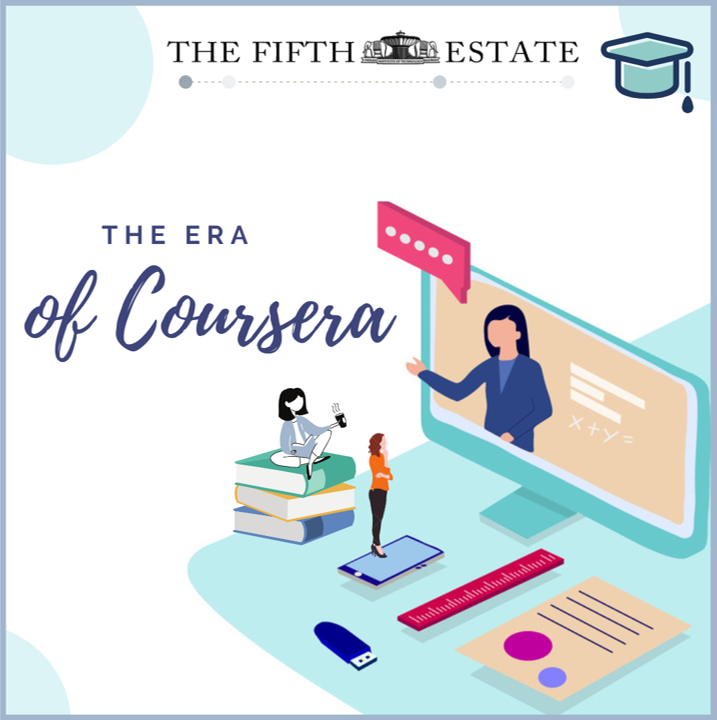Editor: S Vishal
Design: Swati Sheenum
Remember when we had that urge to be productive because we estimated our worth based on our productivity? Of course, we do, because that urge has intensified from having an unprecedented amount of “free” time, whether we realize it or not.
There are a number of activities we resort to, to hide from the guilt of not churning out productivity- A bunch of classic series, a few attempts in the kitchen, those video games that your sem work was holding you from or even apping for 5 different PoRs just because you can. Maybe even the futile online classes that you were pushing yourself to attend, were. But this brings me to think: could these MOOCs be one of them?
What are MOOCs you ask? They are Massive Online Open Courses on any theme you would like to learn from, made easily accessible to you. Perhaps, websites like Udemy, EdX and Coursera strike a chord. These websites have cropped up in the recent past for students to take up courses from the comfort of their homes.
Why take a MOOC?
From how I see it, there are three reasons why we take up a MOOC: interest, guilt and the most obvious of them all, a marginally better CV. Different people sign up with different combinations of these. For some, the interest gives them the bonus of a better CV, for some, a mild interest in something, coupled with a tinge of guilt pushes them to make an effort for an additional CV point and for the rest, the guilt drives them towards a better CV. Given the number of “CV”s that have been used in the last sentence, it is not hard to figure out that a MOOC will prop up one’s CV, regardless of the extent to which it does so. They help you make your case. But the real question is, do they, by themselves, make a sound one?
In the case of doing it out of interest, doubt clarification is an issue on every level. Looking for answers beyond the automated clarification, if any, presented by the website ultimately lands one in Google or YouTube. The related information that one continues to click on, propelled by their interest in the subject, leads to gradual learning undoubtedly. On that account, the online course helps significantly in thrusting us deep into the subject by providing a base that compels us to proceed further.

Are MOOCs the only good way to learn?
Assuming we have an interest that stimulates us in the first place, the structure that these online courses provide could be entirely provided by customized projects that can be taken on individually. That is, if you are looking to learn python or C++ and you really have the interest for it, you would have two options. One would be to sign up for an online course from a well-known website, read through their material, pass their tests and attempt the final assessment for a certificate that suggests that you have some authentic knowledge in the subject. The other would be to try to develop a cool and useful application- either on your own or for competitions like hackathons- whilst learning how to do it. The former would provide you with a certificate and the latter would provide you with a prototype and/or a podium result.
Essentially, the difference between the two options would be the proportion that gives you the ability to learn holistically.
In other words, the online course, in its entirety, cannot provide that learning but could only have complemented your interest by driving you in a specific direction. On the other hand, the building of the prototype would have equipped you with the practical skill and the subsequent theoretical knowledge and its final function would have already assessed your learning the second it came into existence. Instantly, the online course gets removed from the equation, assuming that it is equated to having learned a skill not just on paper.
Yet, as tempting as it might seem, this does not mean that academic classes- online or offline- should give way to practical experiments altogether.
The significance of the role played by a teacher or a professor in our learning process might vary according to our individual experiences. Nevertheless, they are important and at times, necessary too. For example, if you are interested in philosophy, your process of learning would not be complete until an individual with prior knowledge on it gives you relevant perspectives to approach it with.

In the wide spectrum of online and offline learning, MOOCs might seem like an efficient method. Customarily, they boom because of the homogeneity of their course material and tutoring. It enables people with different qualifications and backgrounds, cutting across institutions and countries, to be able to access and comprehend the content, and effectively so. But this reason why they thrive is also the reason why they do not sufficiently fulfil our knowledge appetites. They tend to be so homogenous that they put the relevant interest to bed at times. Not to dishonour virtual classrooms, but basing the judgement on distraction level at the minimum and subsequently, the attention level brings us here:
Physical classrooms as a means for education are indispensable, but online courses that do not push us to gain demonstrable skills are not.
Hang in there, I am not here to tell you that online courses are worth nothing or that we need to bring back gurukuls.
The bright side:
Building a prototype, working your way through a competition, or even just attending your regular classes are individually better than a few MOOCs but it does not mean that online courses equate to the waste of time after all. The objective is not to remove online courses from the equation but to look for the best variations of the expression which has the factor by equating it to the gain of demonstrable knowledge.
When an interest lands us in a project with a professor, CFI, a research paper or even a simple elective, online courses for that subject instantly seem unprofitable. But what we do not consider is the fact that online courses, which equip us with basic knowledge, could supplement or at times even complement these formal projects, at least structurally.
And what about subjects that do not provide us with concrete skills like coding or designing? What if we want to learn about anthropology or the Japanese culture of Ikigai? Reading a bunch of books would most certainly help us but it is undeniable that an online course can complement this learning not only by providing the process a structure but also by providing drawn-out explanations and assessments which cannot be replaced by a prototype, owing to the nature of the subject.
Online courses indeed add value to us but not by themselves. We cannot make our case about our knowledge of something with just an MOOC certificate. It stands as a supplement to the efforts produced by an interest and that is all.
But all things considered, what is the worst that could happen if all one really needs is the certificate? They like the subject and they feel guilty for lazing around half the time they are awake. What about it? A certificate, some surface-level learning and minimum to no evident knowledge about the specialism is exchanged with the guilt of unproductivity. Worst case scenario, you would be getting yourself into a spiral of busyness mistaking it for productivity and earn a bunch of verified certificates in the meantime.
And as long as certificates are being awarded, although the courses by themselves do not make a sound case, I would not disagree with them adding value. But if you are someone who just wants the certificate and believes that guilt is not the factor driving them towards it, I am sorry you read this article for nothing. Perhaps you could take up another course to handle that mild frustration of having wasted 5 minutes unproductively. All the best 🙂





